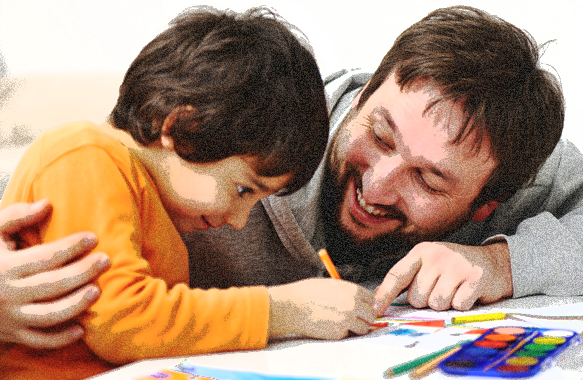‘Helicopter Parenting’ Hysteria
Photograph Credit; Shutterstock _Film Grain Filter
By Alfie Kohn | Originally Published at Huffington Post. September 4, 2014 4:50 PM EDT
By Alfie Kohn | Originally Published at Huffington Post. September 4, 2014 4:50 PM EDT
Helicopter parents of college-age children are the folks we love to hate. A steady stream of articles and blog posts bristle with indignation over dads who phone the dean about a trivial problem or moms who are too involved with junior’s love life. But how common are such incidents, really? And how damaging are the effects of helicopter parenting (HP) when it does occur?
Even academic articles on the subject tend to offer generalizations drawn from popular media coverage — coverage that, in turn, relies mostly on anecdotes. When you track down hard data, however, the results contrast sharply with the conventional wisdom. Yes, most parents are in touch with their college-age children on a regular basis. But communicating isn’t the same thing as intervening on a child’s behalf, and the latter seems to be fairly rare. The National Survey of Student Engagement (NSSE), which reached out to more than 9,000 students at 24 colleges and universities, found that only 13 percent of college freshmen and 8 percent of seniors said a parent had frequently intervened to help them solve problems.
As one university administrator told the Chronicle of Higher Education, “The popular image of modern parents as high-strung nuisances who torment college administrators doesn’t match reality.” In any case, students certainly don’t seem to be tormented by their parents. An overwhelming majority of the 10,000-plus University of California students contacted in a separate 2009 survey said their parents weren’t involved in their choice of courses or their major.
Alarming media reports have also claimed that parents hover when their young-adult children enter the workplace, but there’s little basis for that claim either. Michigan State University researchers found that 77 percent of the 725 employers they surveyed “hardly ever witnessed a parent while hiring a college senior.” As for grown children outside of college and the workplace, the only study on the topic I could find, published in 2012, reported that just one in five or six parents seemed to be intensely involved in their children’s lives.
But what about the effects of such parenting when it does occur? Three small studies have raised concerns about the more extreme versions of HP, connecting it to anxiety or a lower sense of well-being. In each of these studies, questionnaires were given to about 300 students at a single college. But it turned out that the items on these questionnaires were mostly tapping how controlling the parents were. If the problem is control rather than indulgence, that forces us to rethink the “coddled kids” narrative offered by many critics of HP.
And there’s another problem: It’s not clear that HP caused the problems with which it was associated. The researchers in one study acknowledged that unhappy students “may view their parents as more intrusive.” Those in another admitted that “when parents perceive their child as depressed, they may be more likely to ‘hover.'” In other words, pre-existing unhappiness may have drawn the parents in, or it may have led the empathyeducates – ‘Helicopter Parenting’ Hysteria:

